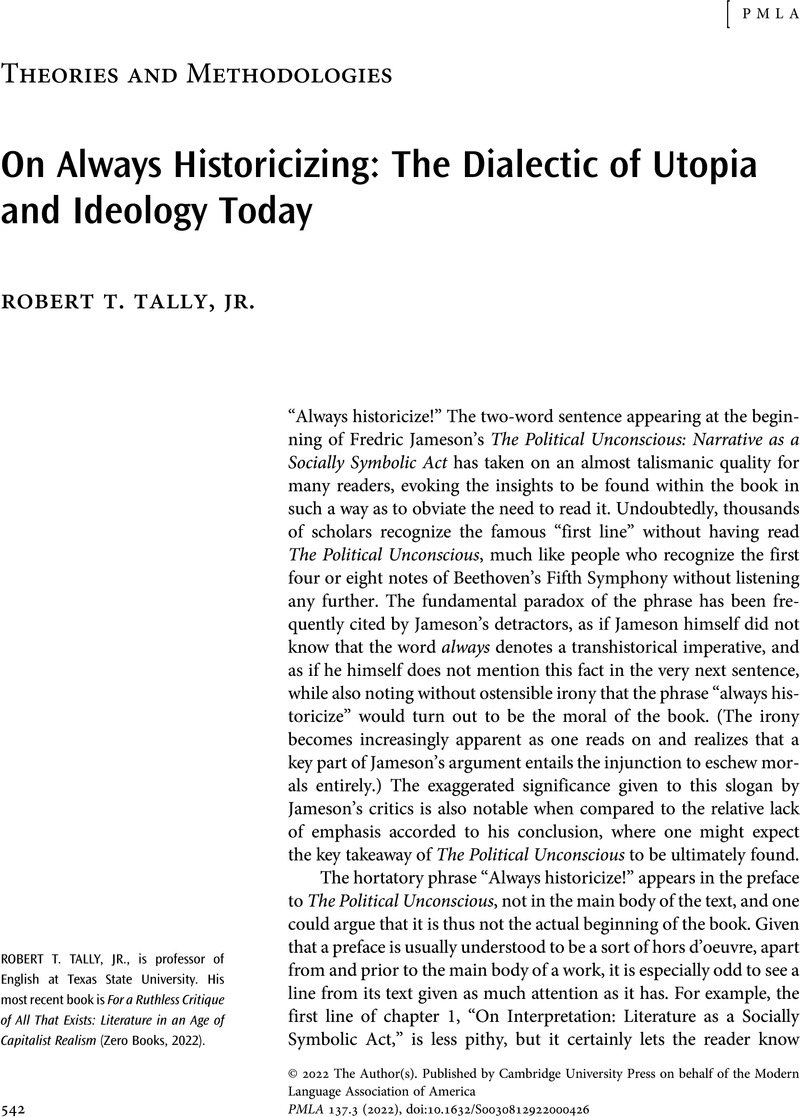No CrossRef data available.
Article contents
On Always Historicizing: The Dialectic of Utopia and Ideology Today
Published online by Cambridge University Press: 28 July 2022
Abstract
An abstract is not available for this content so a preview has been provided. Please use the Get access link above for information on how to access this content.

- Type
- Theories and Methodologies
- Information
- Copyright
- Copyright © 2022 The Author(s). Published by Cambridge University Press on behalf of the Modern Language Association of America
References
Works Cited
Anker, Elizabeth S., and Felski, Rita. Introduction. Critique and Postcritique, edited by Anker, and Felski, , Duke UP, 2017, pp. 1–28.Google Scholar
Benjamin, Walter. “Theses on the Philosophy of History.” Illuminations: Essays and Reflections, edited by Arendt, Hannah, translated by Zohn, Harry, Schocken Books, 1969, pp. 253–64.Google Scholar
Best, Stephen, and Marcus, Sharon. “Surface Reading: An Introduction.” Representations, vol. 108, no. 1, Nov. 2009, pp. 1–21.CrossRefGoogle Scholar
Buchanan, Ian. “Reading Jameson Dogmatically.” Historical Materialism, vol. 10, no. 3, Jan. 2002, pp. 223–43.CrossRefGoogle Scholar
Jameson, Fredric. “Interview with Xudong Zhang.” Jameson on Jameson: Conversations on Cultural Marxism, edited by Buchanan, Ian, Duke UP, 2007, pp. 171–202.CrossRefGoogle Scholar
Jameson, Fredric. Introduction. The Ideologies of Theory, Volume 1: Situations of Theory, U of Minnesota P, 1988, pp. xxv–xxix.Google Scholar
Jameson, Fredric. Marxism and Form: Twentieth-Century Dialectical Theories of Literature. Princeton UP, 1971.Google Scholar
Jameson, Fredric. The Political Unconscious: Narrative as a Socially Symbolic Act. Cornell UP, 1981.Google Scholar
Ricoeur, Paul. Freud and Philosophy: An Essay on Interpretation. Translated by Savage, Denis, Yale UP, 1970.Google Scholar
Said, Edward W. “The Return to Philology.” Humanism and Democratic Criticism, Columbia UP, 2004, pp. 57–84.Google Scholar
Sedgwick, Eve Kosofsky. “Paranoid Reading and Reparative Reading; or, You're So Paranoid, You Probably Think This Essay Is about You.” Touching Feeling: Affect, Pedagogy, Performance, Duke UP, 2003, pp. 123–52.CrossRefGoogle Scholar
Serge, Victor. Memoires of the Revolutionary. Translated by Sedgwick, Peter and Paizis, George, New York Review of Books, 2012.Google Scholar


